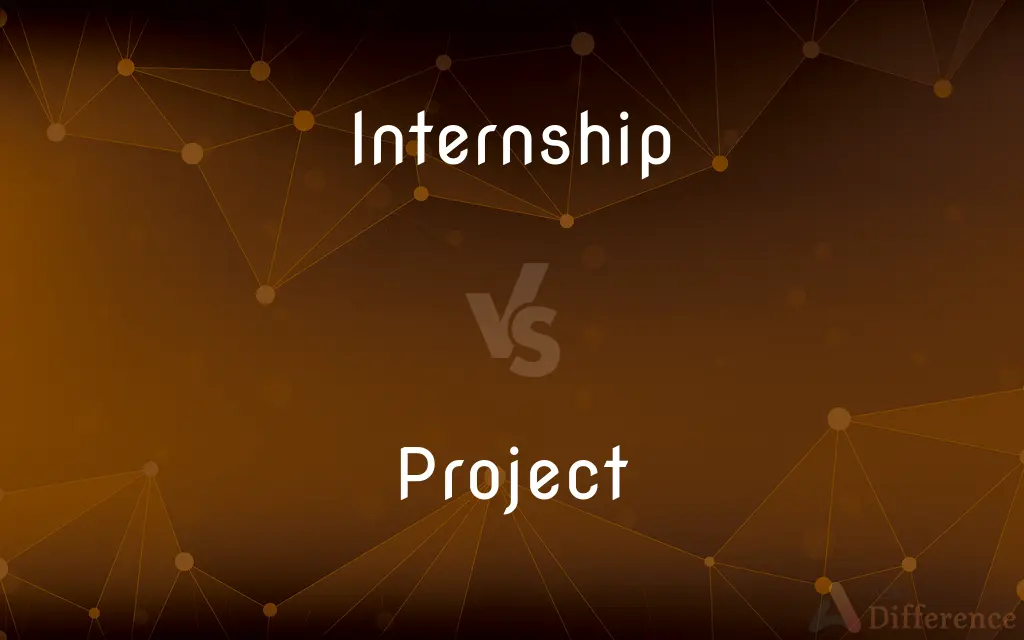Internship vs. Project — What's the Difference?
Edited by Tayyaba Rehman — By Fiza Rafique — Updated on April 5, 2024
Internships provide practical experience through work assignments within companies, whereas projects involve specific tasks completed within a set timeframe, often for academic credit.

Difference Between Internship and Project
Table of Contents
ADVERTISEMENT
Key Differences
Internships are structured programs offered by organizations to provide hands-on work experience, often related to a student's field of study. Interns might work on various tasks to understand industry practices better. Projects, on the other hand, are defined pieces of work with a specific goal, timeline, and outcome, usually part of academic coursework or professional assignments. They allow individuals to apply theoretical knowledge in a practical context.
While internships often last for a few months and can either be paid or unpaid, depending on the industry and the intern's role, projects tend to have a more defined timeframe, which could range from a few weeks to an entire semester in an academic setting. The duration is determined by the scope and objectives of the project.
Internships provide an opportunity for networking and gaining industry insight, as interns interact with professionals and sometimes participate in meetings or organizational events. Projects, however, are usually more focused on achieving specific results or solving particular problems, which might limit interaction outside the project team.
Feedback in internships comes through performance evaluations, mentorship, and daily interactions with supervisors and colleagues. This feedback is integral to professional growth and learning. In contrast, project feedback is often more structured and formal, coming through academic grading or project review sessions, focusing on the outcomes and processes used in the project.
Internships can significantly enhance a resume by demonstrating practical work experience and industry exposure, making candidates more attractive to future employers. Projects, while also valuable, showcase a candidate’s ability to complete specific tasks, problem-solve, and manage time effectively, highlighting their technical and academic proficiency.
ADVERTISEMENT
Comparison Chart
Purpose
To gain practical work experience and industry insight.
To achieve a specific goal or solve a problem within a deadline.
Duration
Several weeks to months.
Can vary from a few weeks to several months.
Outcome
Practical experience, networking opportunities, possibly credit or a job offer.
A product, solution, or academic credit.
Feedback
Performance evaluations, mentorship.
Structured reviews, academic grading.
Key Benefit
Enhances resume with work experience and industry exposure.
Demonstrates problem-solving and project management skills.
Compare with Definitions
Internship
Educational Component.
Interns attend workshops on industry practices and project management as part of their internship program.
Project
Defined Goal and Timeline.
The project aimed to develop a mobile app within two months.
Internship
Professional Networking.
During her internship, she expanded her professional network by connecting with colleagues and industry professionals.
Project
Innovative Solutions.
Their project introduced an innovative solution to waste management.
Internship
Mentorship and Guidance.
Each intern was assigned a mentor to guide them through their projects and daily tasks.
Project
Application of Knowledge.
Students applied their coding skills to solve real-world problems in their final year project.
Internship
Structured Work Experience.
A three-month internship at a tech company provides hands-on experience in software development.
Project
Team Collaboration.
The project was completed successfully thanks to effective collaboration among team members.
Internship
Potential for Employment.
His outstanding performance in the internship led to a full-time job offer at the company.
Project
Academic Credit.
Completing the project was essential for obtaining academic credit towards their degree.
Internship
An internship is a period of work experience offered by an organization for a limited period of time. Once confined to medical graduates, internship is used for a wide range of placements in businesses, non-profit organizations and government agencies.
Project
A project (or program) is any undertaking, carried out individually or collaboratively and possibly involving research or design, that is carefully planned (usually by a project team, but sometimes by a project manager or by a project planner) to achieve a particular aim.An alternative view sees a project managerially as a sequence of events: a "set of interrelated tasks to be executed over a fixed period and within certain cost and other limitations".A project may be a temporary (rather than permanent) social system (work system), possibly staffed by teams (within or across organizations) to accomplish particular tasks under time constraints.A project may form a part of wider programme management or function as an ad hoc system.Note that open-source software "projects" or artists' musical "projects" (for example) may lack defined team-membership, precise planning and/or time-limited durations.
Internship
A student or a recent graduate undergoing supervised practical training.
Project
An undertaking requiring concerted effort
A community cleanup project.
A government-funded irrigation project.
Internship
A physician who has recently graduated from medical school and is learning medical practice in a hospital under supervision, prior to beginning a residency program.
Project
An extensive task undertaken by a student or group of students to apply, illustrate, or supplement classroom lessons.
Internship
One who is interned; an internee.
Project
A plan or proposal for accomplishing something.
Internship
To train or serve as an intern.
Project
Also projects A housing project.
Internship
To confine, especially in wartime.
Project
To thrust outward or forward
Project one's jaw in defiance.
Internship
A job taken by a student in order to learn a profession or trade.
Project
To throw forward; hurl
Project an arrow.
Internship
The state of being an intern; the position of an intern.
Project
To send out into space; cast
Project a light beam.
Internship
The period of time during which a person is an intern; as, she served her internship over the summer.
Project
To cause (an image) to appear on a surface by the controlled direction of light
Projected the slide onto a screen.
Internship
A program to provide novices in a field with apprenticeship training.
Project
(Mathematics) To produce (a projection).
Internship
The period of time during which a novice in a field serves in a subordinate capacity and continues to gain experience; the learning period before one becomes an expert.
Project
To direct (one's voice) so as to be heard clearly at a distance.
Internship
The position of a medical intern
Project
(Psychology) To attribute (one's own emotion or motive, for example) to someone else unconsciously in order to avoid anxiety or guilt.
Project
To convey an impression of to an audience or to others
A posture that projects defeat.
Project
To form a plan or intention for
Project a new business enterprise.
Project
To calculate, estimate, or predict (something in the future), based on present data or trends
Projecting next year's expenses.
Project
To extend forward or out; jut out
Beams that project beyond the eaves.
Project
To direct one's voice so as to be heard clearly at a distance.
Project
A planned endeavor, usually with a specific goal and accomplished in several steps or stages.
Project
An urban low-income housing building.
Projects like Pruitt-Igoe were considered irreparably dangerous and demolished.
Project
(dated) An idle scheme; an impracticable design.
A man given to projects
Project
A raw recruit who the team hopes will improve greatly with coaching; a long shot diamond in the rough
Project
(obsolete) A projectile.
Project
(obsolete) A projection.
Project
(intransitive) To extend beyond a surface.
Project
(transitive) To cast (an image or shadow) upon a surface; to throw or cast forward; to shoot forth.
Project
(transitive) To extend (a protrusion or appendage) outward.
Project
(transitive) To make plans for; to forecast.
The CEO is projecting the completion of the acquisition by April 2007.
Project
To present (oneself), to convey a certain impression, usually in a good way.
Project
To assume qualities or mindsets in others based on one's own personality.
Project
(cartography) To change the projection (or coordinate system) of spatial data with another projection.
Project
(geometry) To draw straight lines from a fixed point through every point of any body or figure, and let these fall upon a surface so as to form the points of a new figure.
Project
(neuroanatomy) (of a neuron or group of neurons) to have axon(s) extending to and therefore able to influence a remote location
Project
To speak or sing in such a way that one can be heard from a large distance away.
Project
The place from which a thing projects, or starts forth.
Project
That which is projected or designed; something intended or devised; a scheme; a design; a plan.
Vented much policy, and projects deep.
Projects of happiness devised by human reason.
He entered into the project with his customary ardor.
Project
An idle scheme; an impracticable design; as, a man given to projects.
Project
To throw or cast forward; to shoot forth.
Before his feet herself she did project.
Behold! th' ascending villas on my sideProject long shadows o'er the crystal tide.
Project
To cast forward or revolve in the mind; to contrive; to devise; to scheme; as, to project a plan.
What sit then projecting peace and war?
Project
To draw or exhibit, as the form of anything; to delineate; as, to project a sphere, a map, an ellipse, and the like; - sometimes with on, upon, into, etc.; as, to project a line or point upon a plane. See Projection, 4.
Project
To shoot forward; to extend beyond something else; to be prominent; to jut; as, the cornice projects; branches project from the tree.
Project
To form a project; to scheme.
Project
Any piece of work that is undertaken or attempted;
He prepared for great undertakings
Project
A planned undertaking
Project
Communicate vividly;
He projected his feelings
Project
Extend out or project in space;
His sharp nose jutted out
A single rock sticks out from the cliff
Project
Transfer (ideas or principles) from one domain into another
Project
Project on a screen;
The images are projected onto the screen
Project
Cause to be heard;
His voice projects well
Project
Draw a projection of
Project
Make or work out a plan for; devise;
They contrived to murder their boss
Design a new sales strategy
Plan an attack
Project
Present for consideration
Project
Imagine; conceive of; see in one's mind;
I can't see him on horseback!
I can see what will happen
I can see a risk in this strategy
Project
Put or send forth;
She threw the flashlight beam into the corner
The setting sun threw long shadows
Cast a spell
Cast a warm light
Project
Throw, send, or cast forward;
Project a missile
Project
Regard as objective
Common Curiosities
What is a project?
A project is a task or set of tasks with a specific goal and deadline, often part of academic coursework or professional work.
How long does an internship last?
An internship can last from a few weeks to several months, depending on the organization and the intern's availability.
What is the purpose of a project?
The purpose of a project is to achieve a specific outcome or solve a problem within a set timeframe.
What skills can be gained from a project?
Projects can help develop problem-solving, project management, teamwork, and technical skills.
What is an internship?
An internship is a temporary position that offers practical work experience in a specific field of study or industry.
Can internships lead to employment?
Yes, internships can sometimes lead to employment opportunities based on the intern's performance and the company's needs.
How do internships and projects differ in terms of feedback?
Internships offer continuous feedback through mentorship and performance evaluations, whereas projects often receive structured and formal feedback upon completion.
What is the key outcome of a project?
The key outcome of a project is a product, solution, or academic credit, demonstrating the application of knowledge and skills.
How are projects evaluated?
Projects are evaluated based on the achievement of objectives, quality of work, innovation, and effective use of resources.
What is the difference in duration between internships and projects?
Internships often have a set duration determined by the employer, while project timelines are defined by the scope and objectives of the work.
Can projects be done individually?
Yes, projects can be undertaken individually or as part of a team, depending on the project's requirements.
Are internships paid?
Internships can be paid or unpaid, depending on the industry, company policy, and the nature of the internship.
Can internships be part of academic coursework?
Yes, some academic programs require or offer internships as part of the curriculum for academic credit.
What benefits do internships offer?
Internships provide work experience, industry insights, professional networking, and sometimes academic credit or a path to employment.
How do internships and projects contribute to professional development?
Internships offer practical work experience and industry exposure, while projects demonstrate one's ability to manage tasks, solve problems, and innovate.
Share Your Discovery

Previous Comparison
Default vs. Forfeit
Next Comparison
Longitudinal vs. AxialAuthor Spotlight
Written by
Fiza RafiqueFiza Rafique is a skilled content writer at AskDifference.com, where she meticulously refines and enhances written pieces. Drawing from her vast editorial expertise, Fiza ensures clarity, accuracy, and precision in every article. Passionate about language, she continually seeks to elevate the quality of content for readers worldwide.
Edited by
Tayyaba RehmanTayyaba Rehman is a distinguished writer, currently serving as a primary contributor to askdifference.com. As a researcher in semantics and etymology, Tayyaba's passion for the complexity of languages and their distinctions has found a perfect home on the platform. Tayyaba delves into the intricacies of language, distinguishing between commonly confused words and phrases, thereby providing clarity for readers worldwide.
















































